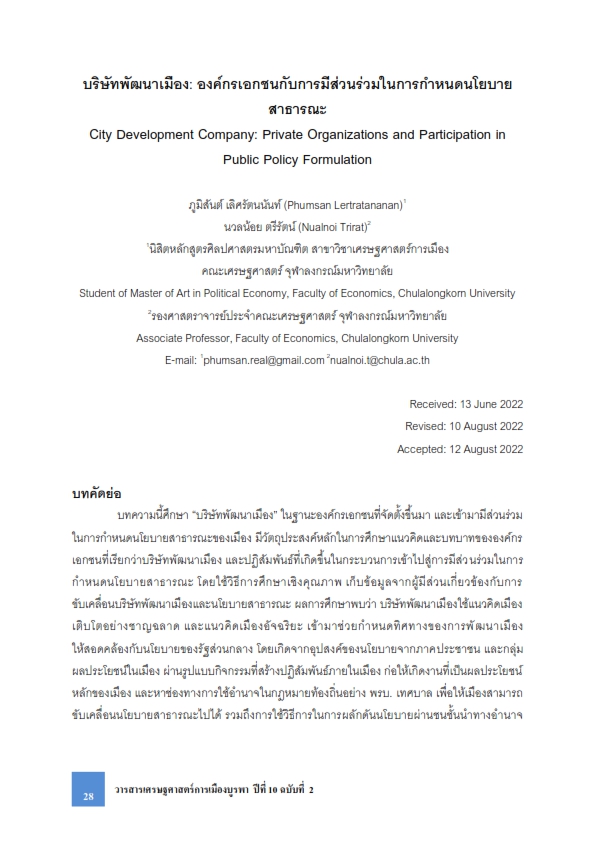City Development Company: Private Organizations and Participation in Public Policy Formulation
Keywords:
City development company, City development, Public policy, Private organizationAbstract
This article studies “City Development Company” as a private organization established to take part in making the city's public policy. Its main objective is to study the concept and role of a private organization known as a city development company and the interactions that occur in the process of participating in public policy making by using a qualitative study method that collects data from people involved in the movement of the city development company and public policy. The results of the study found that city development company uses the smart growth city and smart city concept to help to determine the direction of city development in accordance with the policy of the central government which is caused by the demand for policies from the public sector and interest groups in the city through activities that create interactions within the city. This creates jobs that are the main interests of the city and finds a way to use the power in local laws such as the Municipality Act so that the city can drive public policy also including the use of methods for advocating policies through the power elite at both the provincial and national levels and use research data to build the weight and rationale of public policy and build relationships with the media as well.
References
กระทรวงศึกษาธิการ. (2540). รัฐธรรมนูญแห่งราชอาณาจักรไทย พุทธศักราช 2540. กรุงเทพฯ: โรงพิมพ์ การศาสนา.
กาญจนา แก้วเทพ และสมสุข หินวิมาน. (2551). สายธารแห่งนักคิดทฤษฎีเศรษฐศาสตร์การเมืองกับ สื่อสารศึกษา. กรุงเทพฯ: ภาพพิมพ์.
เกวลี เพชรศรีชาติ. (2560). นโยบายสาธารณะว่าด้วยการพัฒนาเมือง. วิทยานิพนธ์ปริญญามหาบัณฑิต, คณะรัฐศาสตร์, จุฬาลงกรณ์มหาวิทยาลัย.
เครือข่ายเชียงใหม่จัดการตนเอง. (2555). (ร่าง) พระราชบัญญัติระเบียบบริหารราชการเชียงใหม่มหานคร พ.ศ. ....... เชียงใหม่: วนิดาการพิมพ์.
ชนิษฎา ชูสุข และคณะ. (2559). กระบวนการนโยบายสาธารณะในการพัฒนาเมืองหาดใหญ่. วารสารการ บริหารท้องถิ่น, 9(2), 35-47.
ฐานเศรษฐกิจ. (2561). ดึง 15 บริษัทพัฒนาเมืองร่วมขับเคลื่อนยุทธศาสตร์ชาติไทย. วันที่ค้นข้อมูล 12 พฤษภาคม 2562, เข้าถึงได้จาก https://www.thansettakij.com/business/314382
เดชรัต สุขกำเนิด. (2547). นโยบายสาธารณะกับสุขภาพของคนไทย. กรุงเทพฯ: อุษาการพิมพ์.
ธีรภัทร์ ลอยวิรัตน์. (2550). บทบาททางการเมืองของหอการค้าจังหวัดนครศรีธรรมราชต่อการกำหนด นโยบายสาธารณะ. วิทยานิพนธ์ปริญญามหาบัณฑิต, บัณฑิตวิทยาลัย, มหาวิทยาลัยเชียงใหม่.
พิชญ์ พงศ์สวัสดิ์. (2560). เมือง-กิน-คน (พิมพ์ครั้งที่ 2). นนทบุรี: ศูนย์ศึกษามหานครและเมือง
มหาวิทยาลัยรังสิต.
รังสรรค์ ธนะพรพันธุ์. (2546). กระบวนการกำหนดนโยบายเศรษฐกิจในประเทศไทย: บทวิเคราะห์เชิง ประวัติศาสตร์เศรษฐกิจการเมือง พ.ศ. 2475-2530. กรุงเทพฯ: โครงการจัดพิมพ์คบไฟ.
วีระศักดิ์ เครือเทพ และภาวิณี ช่วยประคอง. (2557). รายงานการวิจัยการติดตามและประเมินผลการ กระจาย อำนาจของไทย. กรุงเทพฯ: สำนักงานปลัดสำนักนายกรัฐมนตรี.
ศรายุทธ คชพงศ์ และคณะ. (2564). การนำนโยบายสาธารณะไปปฏิบัติขององค์กรปกครองส่วนท้องถิ่น. Journal of Modern Learning Development, 6(5), 274-288.
ศุภชัย ยาวะประภาษ และปิยากร หวังมหาพร. (2552). นโยบายสาธารณะไทย: กำเนิด พัฒนาการและ สถานภาพของศาสตร์. กรุงเทพฯ: จุดทอง.
ศุภวัฒนากร วงศ์ธนวสุ และคณะ. (2562). ขอนแก่นโมเดล: Khon Kaen Model. ขอนแก่น: คลังนานา วิทยา.
ศุภสวัสดิ์ ชัชวาล. (2562). พลวัตการกระจายอำนาจในประเทศไทย จาก พ.ศ. 2535 – 2561. กรุงเทพฯ: สถาบันพระปกเกล้า.
สำนักงานคณะกรรมการสุขภาพแห่งชาติ. (ม.ป.ป.). นโยบายสาธารณะแบบมีส่วนร่วม. วันที่ค้นข้อมูล 12 พฤษภาคม 2562, เข้าถึงได้จาก https://infocenter.nationalhealth.or.th/node/119
สำนักงานบริหารและพัฒนาองค์ความรู้ (องค์การมหาชน). (2558). รายงานผลสำรวจและศึกษาวิจัยชุด ความรู้ ส่องโอกาส สร้างอาชีพ การขยายตัวของความเป็นเมือง (urbanization). กรุงเทพฯ: ดิ วันโอวัน เปอร์เซ็นต์.
สำนักงานเลขาธิการวุฒิสภา. (2554). รัฐธรรมนูญแห่งราชอาณาจักรไทย พุทธศักราช 2550 แก้ไขเพิ่มเติม ถึง (ฉบับที่ 2 พุทธศักราช 2554). กรุงเทพฯ: สำนักงานเลขาธิการวุฒิสภา.
อัญมณี ปินใจ. (2546). บทบาทของหอการค้าจังหวัดเชียงใหม่ต่อนโยบายสาธารณะ. วิทยานิพนธ์ปริญญา มหาบัณฑิต, บัณฑิตวิทยาลัย, มหาวิทยาลัยเชียงใหม่.
ภาษาอังกฤษ
Aiken, M. (2014). Private corporations shaping public policy: How can third sector organizations influence for profit organizations?. Retrieved May 10, 2019, from www.istr.org/resource/resmgr/MunsterAbstracts/Aiken,_Mike.pdf
Crouch, C. (2011). Giant corporations: A problem of democracy. in The strange non-death of neo-liberalism. Cambridge, UK: Polity Press.
Dye, T. R. (2002). Understanding public policy. New Jersey: Prentice Hall.
Denhardt, R. B., & Denhardt, J. V. (2007). The new public service: Serving, not steering.
New York: M.E. Sharpe, Inc.
Heurkens, E. (2012). Private sector-led urban development projects: management, partnerships & effects in the Netherlands and the UK. Rotterdam, NL: Sirene Ontwerpers.
Keeley, J., & Scoones, I. (2003). Understanding environmental policy processes: cases from Africa. London: Earthscan Publications.
Koppenjan, Joop F. M., & Enserink, B. (2009). Public–private partnerships in urban infrastructures: Reconciling private sector participation and sustainability. Delft, NL: Delft University of Technology.
The Economist. (2015). Special report Singapore: The Singapore exception. Retrieved December 28, 2018, from http://www.economist.com/sites/default/files/20150718_ singapore.pdf
The Urban Land Institute. (2004). Ten principles for smart growth on the suburban fringe. Washington, D.C.: The Urban Land Institute.






